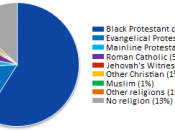Music has been defined by history. Musical developments depended on the changing environments and the people who undergo the changes at those times. These developments, such as slave era music to traditional ragtime music, are examples of music being used as tools to express culture. When the African Americans were brought to America as slaves, they also brought their musical culture overseas. They worked on plantations expressing themselves through work songs and field hollers, which eventually initiated the emergence of spirituals, minstrelsy, and coon songs. This introduction of a new musical culture to America and the developments that occurred from it displays the idea that each style of music provides a foundation for other type of music to build upon.
Slave era music, such as the work songs and field hollers, was a method of continuing oral traditions of African cultures. During this time of slavery, a cultural space was created within which Africans responded to conditions and events in their lives through the help of song and dance.
For example, work songs and field hollers helped workers fulfill their tasks by pacing their activity, coordinating their movements, and rallying their spirits. This singing followed responsorial practice traceable to Africa; with its strict rhythm and short phrases, responsorial singing encouraged improvisation, especially by the leader. (Crawford 49) When African Americans embraced and assimilated into the white society, they did so without breaking their links to African based music making. Not only did this method spread in the plantation fields, but it also was passed onto the musical development of the religious spirituals.
The African American spiritual provides an excellent example of how African cultural memory and American written traditions combined to create a new American form of music. In both North and South, religion loomed large in both black and...


